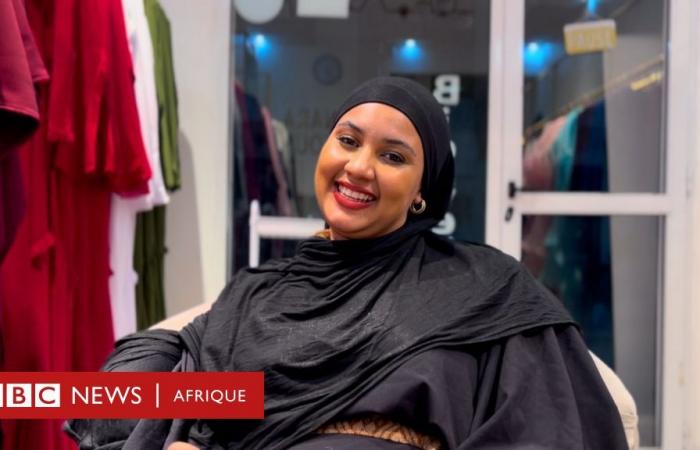Updated 10 minutes ago
In the age of social media, the quest for the perfect image has become an obsession shared by millions of people around the world.
Digital platforms, first seen as a way to connect with others, are today showcases where appearance is sometimes more important than reality.
Behind the selfies, videos and edited photos lies a constant pressure to conform to often unrealistic beauty standards.
The influence of this content on our perception of ourselves has become a subject of debate, as it is so difficult to disentangle the true from the false.
It is in this context that Faynaraa, a young Senegalese influencer, speaks out to denounce the excesses of social networks, while encouraging a questioning of our relationship to image.
Between filters and realities: the influence of social networks on our personal image
The figures speak for themselves: in 2024, more than 5 billion people around the world are active on social networks, or 62.3% of the world population. Platforms like Facebook, Instagram, YouTube and TikTok have become spaces where people share selected pieces of their lives, often enhanced with filters and photo edits.
This trend is intensifying with the popularity of influencers and content creators, who impose standards of beauty and success that are sometimes inaccessible.
Faynaraa, 23, is one of the rising figures of this phenomenon. Born in Ndangane, in the Sine Saloum region of Senegal, she grew up in France before returning to the country after her baccalaureate.
That’s when she started creating content. Very quickly, she became a star on Senegalese social networks, particularly on TikTok, where she managed to accumulate more than a million subscribers in just six months.
But behind her dazzling smile and her dance videos, Faynaraa takes a critical look at the digital world she frequents.
In 2023, she makes an important decision: she decides to put on the veil, a strong gesture in a world where the image is often dictated by external and superficial criteria.
“When I first came to social media, I was 18 and I saw my personality evolve. It wasn't natural, it wasn't me, but rather what society was trying to dictate to me,” she explains.
It was this realization that pushed her to rethink her image, free herself from social pressures and adopt a more authentic version of herself.
Photo credit, Getty Images
Transparency behind cosmetic surgery: a call to conscience
In a world where images are constantly filtered, retouched and modified, Faynaraa believes that it is crucial to restore transparency in the discourse around appearance.
“There should be more transparency. Everyone does what they want, but it would also be important to tell your community that you have had surgery and that this is not the body you naturally have,” underlines- she said.
Indeed, many celebrities and influencers extol the merits of miracle products or express diets to achieve sculpted shapes.
But for Faynaraa, authenticity requires this recognition: “You have to tell your subscribers that it is not thanks to this or that magical product that we obtained this body, but thanks to surgery.”
This speech is important, because it allows us to open the debate on the risks of these practices and the pressure they exert on younger generations.
Faynaraa wants to encourage collective awareness, especially in terms of health.
The role of filters and algorithms: a distorted reality
Filters have become one of the symbols of this quest for digital perfection. Thanks to applications like Instagram, Snapchat or TikTok, any user can instantly modify their features, their skin, or even the shape of their face or body.
This phenomenon, although amusing at first glance, has deeper consequences.
Mountaga Cissé, social media analyst, explains: “The filter modifies perception and breaks reality. It pushes you to project yourself into a character that is not really yourself.”
This gap between the projected image and reality generates pressure, especially among young people who are constantly confronted with unattainable ideals of beauty.
Photo credit, Getty Images
This culture of filters, reinforced by platform algorithms, fuels incessant social comparison.
“You're scrolling through TikTok and you see someone selling products to enhance shapes, you look in the mirror and tell yourself that you don't have great shapes. You lose confidence in yourself and you look for something something else,” confides Mame Fatou Samb, a 25-year-old young woman. She points out this tendency to compare oneself to others, which sometimes leads to deep frustrations and a search for extreme solutions.
But Khady Diop, 26, says she has unshakeable self-confidence. “I accept myself as I am. I have a strong mentality and I am not easily influenced.”
The often harsh criticism that influencers and content creators receive only aggravates this phenomenon. “Young people are often exposed to filtered or idealized content that does not reflect reality,” says Ibraheem, a 26-year-old Senegalese actor. Negative comments, teasing and judgment can be devastating to your self-esteem.
“If you think this could affect your confidence, don’t post anything on social networks,” advises François Ndiaye, another Internet user, who warns against the emotional risks linked to overexposure on these platforms.
The aspiration to virtual fame: a dangerous trap
Social media has also contributed to the emergence of digital celebrity.
Young people, in particular, aspire to this virtual recognition, seeking to increase likes, subscribers and shares. This quest for approval can become a vicious cycle.
“This confirmation that we seek through likes, comments and shares pushes people to continue producing content,” explains Mountaga Cisse.
The Beauty of Authenticity: A Call to Self-Acceptance
This quest for virtual fame has consequences on mental health, warns sociologist Djiby Diakhate.
“At some point, the individual realizes that he is tired of playing a role that is not his own,” he says. “Artificiality takes over and creates a gap between being and appearing.”
This can lead to an inner fracture, a feeling of emptiness and confusion, because the person no longer knows who they really are. This situation can be disastrous, because it creates a cycle of distrust and loss of confidence, both towards oneself and towards others.
Faced with this pressure, Faynaraa, with her experience, advises above all to accept your imperfections: “I give you advice, but I also give it to myself. You are not perfect, and these are your imperfections who create your beauty. Don't rely on certain standards.”
For her, the key lies in authenticity: “Be yourself and embrace this authenticity within you, because that is your true beauty.”
It is this message of reconciliation with oneself that Faynara wants to convey to her subscribers. In a world where appearance is often overvalued, she invites everyone to accept themselves as they are, to free themselves from the dictates of social networks and to embrace their imperfections as a sign of true beauty.
Social networks: a global influence, but at what cost?
The figures for social networks in 2024 demonstrate the colossal impact of these platforms on society.
According to We Are Social/Meltwater, more than 5 billion people are on social media, or approximately 62% of the world's population. More than 35.8% of total time spent on the Internet is spent on social networks.
These figures illustrate the prevalence of digital influence and the growing importance of platforms in our daily lives.
But this omnipresence also raises questions about the side effects, particularly on mental health, self-image and social relationships.
As the world continues to connect through social media, it becomes essential to think about how these platforms shape our perceptions of ourselves and others.
The quest for perfection, filters and the obsession with the ideal image are not without consequences.
But it is possible, according to all the speakers, to find a form of freedom by reconciling with oneself, by emphasizing authenticity and rejecting the standards imposed by a distorted virtual world.






